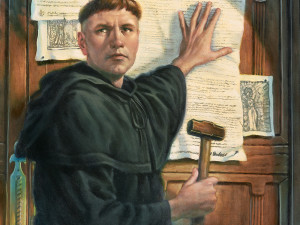by Rev. A. Brian Flamme
 The events of October 31st 1517, the day that Luther nailed his Ninety-Five Theses to the church door in Wittenberg, were not set in motion by a man’s ambitious vision to revolutionize the spirituality of the west. Nor were they set in motion by Luther’s iconoclastic vainglory that sought to topple the ancient powers of tradition and the papacy. Rather, Luther swung his hammer as a pastor. He cared for the eternal welfare of his flock.
The events of October 31st 1517, the day that Luther nailed his Ninety-Five Theses to the church door in Wittenberg, were not set in motion by a man’s ambitious vision to revolutionize the spirituality of the west. Nor were they set in motion by Luther’s iconoclastic vainglory that sought to topple the ancient powers of tradition and the papacy. Rather, Luther swung his hammer as a pastor. He cared for the eternal welfare of his flock.
On March 31st 1515 Pope Leo X issued a bull of plenary indulgence to remove sins’ temporal penalties that clung to the souls of the living and the dead. It took a little while for word to spread, but soon the indulgence salesmen were flooding the areas surrounding Electoral Saxony. What’s an indulgence? Martin Brecht puts it nicely, “An indulgence, or kindness, as one may translate the Latin word, meant the commutation or reduction of penitential acts and temporal punishment for sin by the church…”[i] Leo X’s indulgence was “plenary” which meant that this “kindness” could apply to all sins. “One could get a dispensation for almost all offenses, including adultery and the acquisition of illegal goods.”[ii]
For a price, your anxiety over how long your soul, or the souls of your departed parents, would languish in purgatory could be set aside by a sum of money to help complete construction of St. Peter’s basilica in Rome. Seems like a good deal, right? The pope isn’t claiming, officially, that the eternal guilt of sin is being satisfied by purchasing an indulgence, but rather the punishments that come as result of sin, like the satisfactions prescribed by the priest when you go to confession, or like the chastisements that your soul needs in purgatory to be purified to the point that it can rest in peace before God’s throne in heaven. It seems like the Holy Father might have some authority to set sin’s lesser consequences aside if he’s truly Christ’s vicar on earth and has some control of who gets to profit from the saints’ treasury of merit.
Of course, there are a lot of subtle theological distinctions at play here. When it came down to it, how do you think that the indulgence peddlers, like the Dominican John Tetzel, preached the pontiff’s fundraising campaign? As the saying went, “As soon as the coin in the coffer rings, the soul from purgatory springs.”[iii] So important was the effort to raise funds that the regular order of preaching the gospel was set aside so that the indulgences could be preached.[iv]
 As you can imagine, the residents of Wittenberg ran to Tetzel so they could buy the way to heaven for themselves and their family. These were the same souls who confessed their sins to Luther and had regularly heard him preach the Scriptures. Though Luther had not yet fully grasped the Scriptures’ doctrine of justification that defined the preaching of the Reformation, he still knew enough that his hearers had forsaken godly sorrow over sin and the genuine desire to amend one’s life for a false hope in what money could buy. He wrote the Archbishop of Mainz warning him of the danger and at the same time made his concerns public through posting the Ninety-Five Theses.
As you can imagine, the residents of Wittenberg ran to Tetzel so they could buy the way to heaven for themselves and their family. These were the same souls who confessed their sins to Luther and had regularly heard him preach the Scriptures. Though Luther had not yet fully grasped the Scriptures’ doctrine of justification that defined the preaching of the Reformation, he still knew enough that his hearers had forsaken godly sorrow over sin and the genuine desire to amend one’s life for a false hope in what money could buy. He wrote the Archbishop of Mainz warning him of the danger and at the same time made his concerns public through posting the Ninety-Five Theses.
How far did these abuses extend? Years later, Luther wrote to the clergy assembled at the Diet of Augsburg in 1530 that the peddling of indulgences, with the approval of bishops and popes, amounted to a denial of the God’s grace in the blood of Christ and the torment of Christian consciences. The indulgence preachers didn’t concentrate on saying the pope is only absolving temporal penalties, but guilt in general. The result? There’s no room for the preaching of Christ, his blood, his righteousness, and faith. He listed fifteen specific abuses, but I’ll relate only a few.
“1. They sold the indulgence as the divine grace which forgives sin. Thereby Christ’s blood and death were denied and blasphemed together with the Holy Spirit and the gospel.
2. They falsely sold souls out of purgatory through it, to the great shame of the Divine Majesty, but it brought in lots of money.
3. They thereby put the pope in heaven as a god who could command the angels to carry to heaven the souls of pilgrims who died on their trip to Rome.
4. The gospel, which is, after all, the only true indulgence, had to keep silence in the churches in deference to the indulgence.
8. In the indulgence they sold good works to all of Christendom and absolution, too, as something special, which, however, the gospel forever gives the whole world free of charge. Thus consciences were led astray from the gospel and from Christ to the works of men.”[v]
 In 1537 when Luther looked back at the controversy while writing the Smalcald Articles he identified the erroneous doctrine of repentance as standing behind the whole mess. In the process of striving after having the right kind of sorrow, enumerating all sins, and doing the works of penance, “there was neither faith nor Christ.”[vi] Far from soothing anxious souls, indulgences were proliferated under the guise of a “jubilee year” because of the made money for Rome. As Luther writes, “the people came running” with the hopes of being set free from making up for their sins.
In 1537 when Luther looked back at the controversy while writing the Smalcald Articles he identified the erroneous doctrine of repentance as standing behind the whole mess. In the process of striving after having the right kind of sorrow, enumerating all sins, and doing the works of penance, “there was neither faith nor Christ.”[vi] Far from soothing anxious souls, indulgences were proliferated under the guise of a “jubilee year” because of the made money for Rome. As Luther writes, “the people came running” with the hopes of being set free from making up for their sins.
“Even this did not help at all. For although the pope taught the people to rely on and trust in such indulgences, he himself made the process uncertain when he asserted in his bulls ‘Whoever desires to partake of the indulgence or jubilee year should be contrite, go to confession, and give money.’…. Similarly no one knew which soul was in purgatory, and, of those that were supposedly there, no one knew which had been truly contrite and confessed. Thus, the pope took the money, comforted the people with his authority and indulgence, and nevertheless directed them once again to their uncertain works.”[vii]
Luther is pointing out: What’s the whole point if the people are already binding themselves to the system of repentance? There’s no real certainty to be found except in the works of men at the end of the day. Coincidently, this same critique applies to the modern Roman doctrine of indulgences which requires that the penitent already be “in a state of grace,” “have the interior disposition of complete detachment from sin, even venial sin,” “have sacramentally confessed their sins,” etc.[viii] What more confidence could possibly be given to a person who is already so pure?
Indulgences, in Luther’s day and our own, are nonsense when we bind ourselves to the true repentance taught by the Holy Ghost in Scripture. Both to the man who is trying to pay for his sins and the man who thinks that he needs to do nothing, St. John the Baptist “comes and destroys both sides with a single thunderclap, saying, “Repent!””[ix] No one is righteous (Ps. 143:2; Rom. 3:10). We are all sinners bearing the weakness of our flesh to the day of death. No amount of satisfactions can be rendered to avail before God’s throne but what we gain by faith from Jesus. As Luther writes,
 “All who confess that everything is pure sin with them embrace all sins, allow no exceptions, and do not forget a single one. Thus, satisfaction can never be uncertain either. For it consists not in our uncertain, sinful works but rather in the suffering and blood of the innocent “Lamb of God, who takes away the sin of the world” [John 1:29].”[x]
“All who confess that everything is pure sin with them embrace all sins, allow no exceptions, and do not forget a single one. Thus, satisfaction can never be uncertain either. For it consists not in our uncertain, sinful works but rather in the suffering and blood of the innocent “Lamb of God, who takes away the sin of the world” [John 1:29].”[x]
Are there not temporal and earthly consequences for sin? Of course. But in this regard our example should be the thief on the cross (Luke 23:39-43). He knew he suffered justly for his crimes by being crucified. It’s right that he did. But in the hour of death, he had nothing to offer God but faith, pure trust in Christ alone. “Jesus, remember me when you come into your kingdom.” Jesus told him nothing of satisfactions or purifying his soul in purgatory. He said, “Truly, I say to you, today you will be with me in paradise.”
So it is for you, dear Christian. Before men on this earth, sin comes with consequences and we must bear fruit in keeping with repentance. Good works follow faith. But before God your righteousness and salvation depend on Christ and his Word alone. Money and satisfactions mean nothing.
“The human creature should be called and should be completely righteous and holy – according to the person and his or her works – by the pure grace and mercy that have been poured and spread over us in Christ. Therefore we cannot boast about the great merit of our works, where they are viewed apart from grace and mercy. Rather, as is written, ‘Let the one who boasts, boast in the Lord’ [1 Cor. 1:31; 2 Cor. 10:17].”[xi]
The Rev. A. Brian Flamme is a pastor at Hope Lutheran Church, Aurora, Colo.
[i] Martin Brecht, Martin Luther: His Road to Reformation 1483-1521 (Minneapolis: Fortress Press, 1981), 176. To learn more about the historic origins and abuses of indulgences read Harold Grimm, The Reformation Era 1500-1650, 2nd Edition (New York: Macmillan, 1973), 38-41. Also, Lewis Spitz, The Renaissance and Reformation Movements, Revised Edition, Vol. II (St. Louis: Concordia Publishing House, 1971), 335-337.
[ii] Brecht, 180
[iii] How did these sermons sound? Martin Brecht identifies four graces that the preachers emphasized in their sermons. “They were, first, the complete remission of all sins… The second chief grace consisted of the possibility of obtaining a confessional letter which entitled on twice to receive absolution from all sins, even those reserved to the pope, at a time of one’s own discretion and in the hour of death. The third chief grace, which could also be obtained by buying a confessional letter, promised the one who obtained it and his dead relatives participation in all the church’s goods, i.e., its prayers, fasts, alms, and other pious works. Like the previous grace, this could also be obtained without confession; even in a state of sin one could also participate in the blessings of church fellowship. Not without reason was the fourth grace especially extolled. It consisted of the remission of punishment of sins for souls in purgatory by means of the pope’s intercession when one paid for these souls.” Ibid, 180-182
[iv] Ibid
[v] LW 34:16-17
[vi] SA, III, 3, 20 (Kolb-Wengert, 315)
[vii] SA, III, 3, 27 (Kolb-Wengert, 316)
[viii]http://www.vatican.va/roman_curia/tribunals/apost_penit/documents/rc_trib_appen_pro_20000129_indulgence_en.html
[ix] SA, III, 3, 30 (Kolb-Wengert, 317) Matt. 3:2
[x] SA, III, 3, 37-38 (Kolb-Wengert, 318)
[xi] SA, III, 13, 2-3 (Kolb-Wengert, 325)
